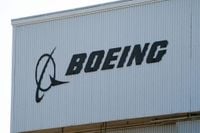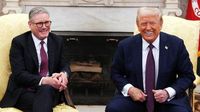On Thursday, May 8, 2025, President Donald Trump announced a new trade deal with the United Kingdom during a live-streamed event from the Oval Office. This agreement, touted as a significant step in U.S.-U.K. relations, aims to open up markets for American agricultural products, including beef and ethanol, while addressing ongoing trade tensions.
Commerce Secretary Howard Lutnick emphasized the deal's potential benefits, stating that the U.K. has committed to reducing imports from other countries to favor U.S. goods. He noted that this would add approximately $5 billion in opportunities for American exporters. "They’ve agreed to open their markets and that will add $5 billion of opportunity to American exporters," Lutnick said.
However, the agreement is not without its complications. Major sticking points remain, particularly concerning the trade of British steel, which is currently subject to a 25 percent tariff. Industry insiders have raised concerns about the effectiveness of Trump's tariffs in boosting U.S. manufacturing jobs, suggesting that the anticipated job growth may not materialize as promised.
During the announcement, Trump described the U.K. market as "a little closed," but expressed optimism about the changes being made to facilitate U.S. exports. He stated, "The U.K. has lowered some non-tariff barriers that [had] unfairly discriminated against American products." Nevertheless, some British press members voiced concerns regarding the quality of meat and food products that would be made available to consumers, given the U.K.'s strict food safety standards.
In addition to agricultural products, the deal allows the U.K. to export up to 100,000 cars annually to the United States, subject to a 10 percent tariff. This provision is expected to generate significant revenue for the U.S., with Lutnick stating, "We still have a 10% tariff on, which will produce $6 billion in revenue for the United States." He also indicated that the agreement is structured to avoid negatively impacting British workers or industries.
Trump's administration is optimistic about the deal, with many officials expressing confidence in its potential to strengthen economic ties between the two nations. "Today is an incredible day for America as we deliver our first Fair, Open, and Reciprocal Trade Deal — something our past Presidents never cared about," Trump declared on Truth Social following the announcement. He highlighted the deal's contributions to national security through the creation of an Aluminum and Steel Trading Zone, as well as a secure Pharmaceutical Supply Chain.
Despite the optimism surrounding the deal, experts have cautioned that it may be more of a preliminary framework than a comprehensive agreement. Justin Wolfers, a professor of economics at the University of Michigan, suggested that the U.K. represents only about 3 percent of U.S. trade and is the U.S.'s 11th largest trading partner. This context raises questions about the long-term impact of the deal.
Moreover, Lutnick hinted at an upcoming $10 billion agreement involving a U.K. airline and Boeing, although he did not disclose the airline's identity. This potential deal has already led to a 3 percent increase in Boeing's stock, indicating positive market sentiment regarding the trade agreement.
As the negotiations continue, Prime Minister Keir Starmer of the U.K. has remained relatively quiet, only confirming that an agreement has been reached. The deal's specifics are still being finalized, and many details remain unclear. Reports indicate that the U.K. was previously relegated to a lower priority in trade negotiations with the U.S., which may have expedited the current agreement.
In summary, the trade deal announced by President Trump represents a significant development in U.S.-U.K. relations, with the potential to reshape trade dynamics between the two nations. While the agreement is being hailed as a win for American exporters, ongoing concerns about tariffs, product quality, and job growth remain at the forefront of discussions.
As the situation evolves, both governments are expected to provide further updates on the agreement's implementation and its impact on their respective economies. Investors and industry stakeholders will be watching closely to see how these developments unfold in the coming months.






